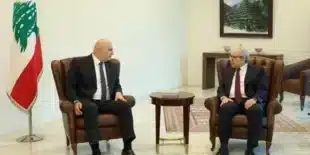Dean Sweetland surveys a desolate street in Kibbutz Malkiya, an Israeli community that overlooks the Lebanese border. Once a vibrant town, Malkiya now sits largely abandoned, a year after its evacuation. The daycare is closed, homes are neglected, and parts of the landscape are scorched from fires caused by Hezbollah rockets. Despite a fragile ceasefire between Israel and Hezbollah aimed at allowing Israelis to return to the north, the mood in Malkiya is far from hopeful.
Sweetland, a gardener and member of the kibbutz’s civilian security team, expresses his disillusionment with the ceasefire. He dismisses the idea of inviting people to return, saying it’s unrealistic. Many in northern Israel share his concerns, remaining cautious about returning due to lingering fears of Hezbollah and a lack of trust in the peacekeeping forces charged with enforcing the truce.
While Lebanese civilians have rushed to return to their homes in the south, many Israelis in northern communities are hesitant. Hezbollah, the militant group based in Lebanon, has long been a threat, and many fear they will return to the border. The Israeli government hopes to revive these communities, particularly those along the border, which have played a key role in securing the country’s northern edge. However, the fear of Hezbollah, distrust of the UN peacekeepers, frustration with the government, and the desire to rebuild elsewhere are keeping many Israelis from coming back.
Before the ceasefire, about 45,000 Israelis fled their homes in northern Israel after Hezbollah launched attacks in solidarity with Hamas in Gaza. The truce’s first phase involves Hezbollah pulling its forces back from southern Lebanon, with the help of UN peacekeepers and an increased Lebanese army presence. But many residents are skeptical that the peace will last.
Sarah Gould, a mother who evacuated Kibbutz Malkiya with her children, is unconvinced by the ceasefire, pointing out that Hezbollah continued its fire on her community even as the truce took effect. For her, the government’s claims that Hezbollah is neutralized are false.
While Israel’s main goal in Gaza is to eliminate Hamas, the objective in Lebanon is simply to push Hezbollah back from the border. Some critics believe Israel should have pursued a more aggressive approach, aiming to cripple Hezbollah once and for all. Gould says she won’t even consider returning until the area is completely cleared of any threat.
Some Israelis have started returning to safer areas farther from the border, but places like Kibbutz Manara, perched between Lebanon and Syria, remain abandoned. Orna Weinberg, a lifelong resident of Manara, says it’s too soon to trust the ceasefire’s effectiveness, given the vulnerability of the community to Hezbollah attacks. The kibbutz has sustained significant damage, with three-quarters of its buildings affected.
Though some residents of Kibbutz Malkiya cautiously returned for a brief visit, many are reluctant to come back permanently. They have spent over a year rebuilding their lives elsewhere, and the thought of returning to a border town feels overwhelming. Schools in the area may lack enough students to reopen, and Gould’s children are already enrolled in schools farther from the conflict.
There’s also a deep sense of abandonment among the people of northern Israel. Sweetland, one of the few who remained during the conflict, helped maintain the kibbutz in the absence of official support. He and others took on the responsibility of keeping the community going, repairing homes, extinguishing fires, and replacing vital infrastructure, all while enduring constant rocket fire. They received little help from the authorities, despite repeated pleas for assistance.
Sweetland continues to watch over the community, hoping his neighbors will feel safe enough to return, but he predicts it could take months. Weinberg, on the other hand, is eager to move back to Manara, though she saw a former neighbor leave in distress after assessing the damage to her home. The emotional toll of the war is evident, and for many, returning to what was once home may take time or may never feel possible.


